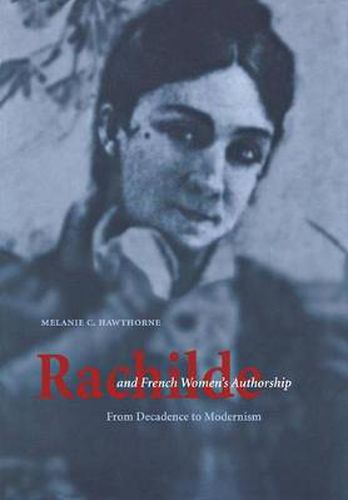Readings Newsletter
Become a Readings Member to make your shopping experience even easier.
Sign in or sign up for free!
You’re not far away from qualifying for FREE standard shipping within Australia
You’ve qualified for FREE standard shipping within Australia
The cart is loading…






Under the assumed name Rachilde, Marguerite Eymery (1860-1953) wrote over sixty works of fiction, drama, poetry, memoir, and criticism, including Monsieur Venus, one of the most famous examples of decadent fiction. She co-founded the literary journal Mercure de France, inspired parts of Oscar Wilde’s The Picture of Dorian Gray, and mingled with all the literary lights of late nineteenth-century France. Yet for all that, very little has been written about her. Melanie Hawthorne corrects this oversight and counters the traditional approach to Rachilde by persuasively portraying this eccentric as patently representative of the French women writers of her time and of the social and literary issues they faced. Seen in this light, Rachilde’s writing clearly illustrates important questions in feminist literary theory as well as significant features of turn-of-the-century French society. Hawthorne arranges her approach to Rachilde around one defining event in the author’s life: the controversial publication of Monsieur Venus, with its presentation of sex reversals. Weaving back and forth in time, she is able to depict this moment in relation to the whole of Rachilde’s life and work and time - and to illuminate nineteenth-century publishing practices and rivalries, including authorial manipulations of the market for sexually suggestive literature. The most complete and accurate account yet written of this emblematic author, Hawthorne’s work is also the first to situate Rachilde in the broader social contexts and literary currents of her time and of our own. Melanie C. Hawthorne is associate professor of Modern Languages at Texas A & M University, College Station. Her publications include Contingent Loves: Simone de Beauvoir and Sexuality and, coedited with Richard Golsan, Gender and Fascism in Modern France. She has also translated Rachilde’s The Juggler and Marie Leneru’s The Woman Triumphant.
$9.00 standard shipping within Australia
FREE standard shipping within Australia for orders over $100.00
Express & International shipping calculated at checkout
Under the assumed name Rachilde, Marguerite Eymery (1860-1953) wrote over sixty works of fiction, drama, poetry, memoir, and criticism, including Monsieur Venus, one of the most famous examples of decadent fiction. She co-founded the literary journal Mercure de France, inspired parts of Oscar Wilde’s The Picture of Dorian Gray, and mingled with all the literary lights of late nineteenth-century France. Yet for all that, very little has been written about her. Melanie Hawthorne corrects this oversight and counters the traditional approach to Rachilde by persuasively portraying this eccentric as patently representative of the French women writers of her time and of the social and literary issues they faced. Seen in this light, Rachilde’s writing clearly illustrates important questions in feminist literary theory as well as significant features of turn-of-the-century French society. Hawthorne arranges her approach to Rachilde around one defining event in the author’s life: the controversial publication of Monsieur Venus, with its presentation of sex reversals. Weaving back and forth in time, she is able to depict this moment in relation to the whole of Rachilde’s life and work and time - and to illuminate nineteenth-century publishing practices and rivalries, including authorial manipulations of the market for sexually suggestive literature. The most complete and accurate account yet written of this emblematic author, Hawthorne’s work is also the first to situate Rachilde in the broader social contexts and literary currents of her time and of our own. Melanie C. Hawthorne is associate professor of Modern Languages at Texas A & M University, College Station. Her publications include Contingent Loves: Simone de Beauvoir and Sexuality and, coedited with Richard Golsan, Gender and Fascism in Modern France. She has also translated Rachilde’s The Juggler and Marie Leneru’s The Woman Triumphant.